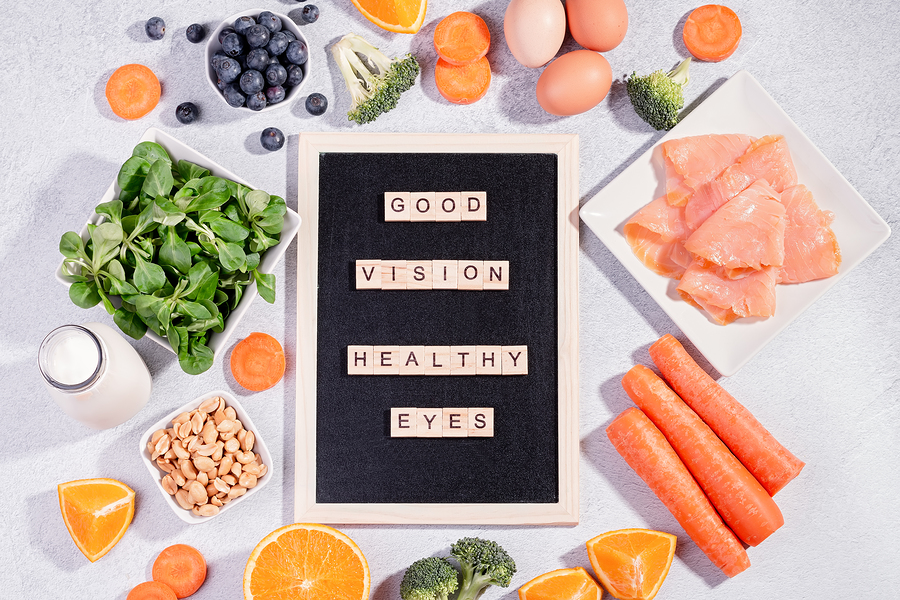How to have healthy eyes
We’re all familiar with the old adage that carrots can help you to see in the dark, but have you ever wondered whether it was actually true?
AXA PPP healthcare physiologist Anthony Glock gives us the lowdown on which nutrients we should be eating to ensure we are doing the best by our eyes.
There are in fact a whole range of foods that contain some of the essential nutrients needed for maintaining healthy eyesight and even though some factors such as age and genetics play their part, ensuring we get the right nutrients through our diet is one way we can help to minimise the chances of developing problems.
Free Radicals
Free radicals are released when the body uses oxygen to produce energy. Although free radicals have the potential to damage our cells our body is well able to cope with them but only if we are consuming a healthy balanced diet. If our body lacks the right nutrients, then it will be unable to absorb vitamins and minerals the way it should. This could result in premature ageing and our eyes, along with other parts of our body, will suffer.
Free radicals have the potential to damage both the retina and lens which may lead to impaired eyesight. Our eyes need a high amount of antioxidant protection compared with other parts of the body as the eye has a high metabolic rate and so will be producing more harmful free radicals. Therefore, eating a wide range of different fruits and vegetables will give our bodies the best chance to help reduce the damage done to the retina and lens in our eyes.
Anthony tells us that a varied, healthy balanced diet will not only keep our eyes healthy but will also help with our overall health and wellbeing.
Which foods should we be eating for our eye health in particular?
Vitamins C & E
C & E vitamins are antioxidants, crucial in protecting our bodies from free radicals as well as external toxins such as air pollution and cigarette smoke. Vitamins C & E work by absorbing potential damage directly in the eyes and so helping to prevent harm.
Foods high in vitamin C include:
- oranges
- red and green peppers
- strawberries
- broccoli
- blackcurrants
Foods high in vitamin E include:
- olive oil
- nuts
- seeds
- cereal products
Vitamin A
Carrots are high in beta carotene, it is what makes them orange, and beta carotene is what is used to form Vitamin A in our bodies. Vitamin A helps our vision in low light, hence the reason why carrots are known for being good for eyes!
Foods that are high in beta carotene are usually orange or yellow in colour, such as:
- carrots
- pumpkins
- peppers
- sweet potato
Zinc
We need zinc to ensure our retinas are working to their best as zinc is able to preserve the cell membrane and proteins in the retina so affecting its structure and function. Zinc is also good as an antioxidant and good for a healthy immune system.
Foods high in zinc are:
- eggs
- whole grains
- peanuts
- turkey
- oysters
- crab
- other meats
Omega 3
Omega 3 has long been heralded for helping to keep our heart and brain healthy but it can also help to protect our eyes. Omega 3 works by combating inflammation and helping cells to function properly.
High amounts of Omega 3 can be found in:
- Salmon
- Sardines
- Herring
- tuna and other tinned fish to a lesser extent
Lutein & Zeaxanthin
It has been shown through scientific studies that individuals with low lutein and zeaxanthin in their diets have a higher risk of developing age-related macular degeneration.
Lutein and Zeaxanthin are carotenoids which work in the same way as vitamins C and E. They are antioxidants which protect our eyes from any harm, in particular, damage from blue light which is emitted from computer screens, mobile phones and tablets.
Lutein and Zeaxanthin are often better absorbed by the body when cooked. Foods to choose are:
- Kale
- Eggs
- Spinach
- red pepper
- broccoli
- leek
- green peas
- kiwi fruit
Along with eating a healthy diet, it is crucial to go for regular eye checks as any problems could be detected at an early stage.
Disclaimer
All content on Silversurfers.com is provided for general information only, and should not be treated at all as a substitute for the medical advice of your own doctor or any other health care professional. Silversurfers will not be responsible or liable for any diagnosis made by a user based on the content on www.silversurfers.com and we are also not liable for the content of any external websites or links from or to Silversurfers to any other websites. Please always consult your own doctor if you’re in any way concerned about any aspect of your health.
Melina - Assistant Editor
Latest posts by Melina - Assistant Editor (see all)
- Asparagus and garlic prawn spaghetti - May 4, 2024
- Cream Cheese Orange Bars - May 2, 2024
- Top tips for hay fever sufferers - April 14, 2024
- Paysan Breton Cream Cheese Breakfast Wraps - April 12, 2024
- 4 Homemade Sweet Treats for Easter - March 24, 2024






















